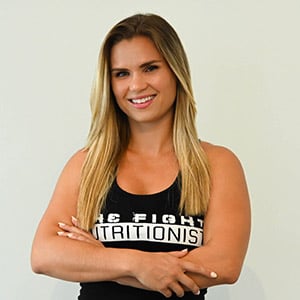Have you always wanted to gain more knowledge and coaching-specific skills when it comes to nutrition? Well, luckily for you, NASM offers three courses to help you get a very thorough education and certify you to use your newly gained knowledge to coach clients.
These three courses offer their own unique takes on nutrition and how they can emphasize each client’s health, wellness, and fitness levels. With that in mind, how do you know which is right for you and your career and interests in fitness?
In this blog, we’ll break down each NASM nutrition-related program and show you why and how each can boost your future as a fitness pro.
A Look at NASM’s Certified Wellness Coach Course
The first product to be introduced is the Certified Wellness Coach (CWC) certification. First, let's define what it means to be a wellness coach. A wellness coach focuses on behavior modifications and looks at every facet of nutritional, mental, and physical health to guide clients into leading a healthier lifestyle.
Wellness coaches act as mentors and advocates to discuss the habits of their clients and give them guidance and suggestions on how to improve areas of emotional health, stress management, mindset, physical recovery, and eating habits. NASM's Certified Wellness Coach certification contains 35 chapters with five main sections: wellness coaching concepts & principles, movement, mental and emotional well-being, nutrition, and coaching tips.
The first section dives into the definition of wellness and the coaching principles behind it. Since wellness coaching and health coaching involve guiding clients through behavior changes, this section focuses heavily on behavior modification strategies, how to build rapport and properly communicate with clients, and defines the scope of practice for a wellness coach.
The second section is all about movement and how it affects mental and physical health. This section also provides insight on how to determine client barriers as it relates to physical exercise and how to make suggestions that align with a client's goals/needs.
The third section discusses the science behind stress, cognition, emotional processing, sleep, and how to improve psychological wellness for your clients. Section four gives you everything you need to know about nutrition! The basics, what healthy dietary patterns involve, what the science says about various diets and their effect on weight loss, training, and overall health, how diet plays a role in disease risk, fueling recommendations for exercising individuals, supplement education, and how to act as a nutrition coaching specialist.
To wrap up this course, you’ll learn what it means to be a wellness coach and how to utilize the appropriate tools and information you just covered to help your clients effectively. It gives you guidance on how to structure coaching sessions, help create wellness plans, maintain client retention, and how develop self-awareness as a practitioner.
A Look at NASM’s Certified Nutrition Coach Course
Next on the list is NASM's Certified Nutrition Coach certification (CNC). A certified nutrition coaching specialist is similar to a health coach or wellness coach. However, the main focus is providing clients with dietary advice. While you cannot prescribe meal plans, you can use evidence-based knowledge to provide your clients with appropriate suggestions to help them meet their goals as it relates to nutritional well-being, weight loss, muscle gain, training, etc.
This course dives much more deeply into the science behind metabolism, macronutrients, micronutrients, and hydration. It also covers supplement education and the efficacy behind specific products. Like the wellness coaching program, the CNC course also dives deep into the psychology behind behavior change and provides learning material on what questions to ask clients, and how to evaluate their readiness for change and create goals to help them meet their goals.
Lastly, this course contains seven content-rich chapters on how to be a successful nutrition coach. From conducting body comp assessments to helping your clients navigate questions regarding label reading, diets, fads/misconceptions, and weight loss plateaus you'll be well-versed in current evidenced-based practices and research within these areas.
A Look at NASM’s Certified Sports Nutrition Coach Course
Last on the list is NASM's Certified Sports Nutrition Coach (CSNC) certification. Like a nutrition coaching professional, the sports certification is heavily focused on the science behind nutrition, BUT… as it relates to exercise performance.
This course teaches you how to help clients gain an edge by manipulating food intake to enhance performance and optimize recovery as it relates to various sports. With 20 in-depth chapters, you'll be educated on fueling principles for different types of athletes, metabolism, and bioenergetics, the role various macronutrients play in energy and recovery for exercise, how to implement specific nutrient timing principles, how to assess body composition in athletic settings, supplement education, essentials of recovery and injury, and insights on how to appropriately coach and monitor athletes and/or very active individuals.
The Overlap
So, when looking at all three of these courses, where do they overlap and how do they differ? And which course would be most appropriate for you?
Regarding content, each course dives into the specifics regarding basic education on nutrition and covers basic macronutrient and micronutrient principles, hydration, and metabolism/absorption of alcohol. Each course also touches on common myths/fads regarding different diets or beliefs about certain food products. However, the differences lie in the specificity of the scope of practice.
For example, the CWC includes an entire section on nutrition, its influence on long-term health, and nutrition coaching tips on how to improve general dietary habits for clients.
However, it also focuses heavily on other areas of "wellness" such as exercise and mental/emotional well-being. The CNC exclusively focuses on nutrition and coaching principles to help improve the dietary habits of clients. The CNC also dives much deeper into the nutrition basics regarding metabolism, macronutrients, micronutrients, hydration, nutrient timing, and supplements.
Similarly, the CSNC also dives into metabolism, macronutrient/micronutrient education, and nutrient timing BUT more specifically as it applies to an athletic population. Every chapter in this course is focused on the influence of various foods as they relate to performance and recovery. This course would be more suited for individuals with a basic nutrition background and looking to work with athletes or elite individuals whose needs vary significantly from a sedentary population.
summary
If your goal is to simply build a foundation of knowledge, the CNC or CWC would be a good place to start. The difference simply lies in your personal goals as a coach. Do you want to exclusively focus on nutrition? Or do you believe physical fitness, psychology, sleep, and stress management all play critical roles in overall health and wellness? Either of these courses would provide you with basic tools and knowledge to appropriately advise clients just beginning a fitness routine.
The CSNC would be a great addition in conjunction with the CNC or CWC. It is always important to first understand the basics and how they relate to most individuals before applying more advanced principles to a specific population. This course would be most suited for someone looking to work with athletes or highly trained individuals.
Overall, each course is rich in evidence-based knowledge. You'll receive an education that is rooted in science and that has been reviewed by various leading experts and professionals in the fields of nutrition, training, physiology, and much more.
For more information on this topic, check out our NASM-CNC page.

















